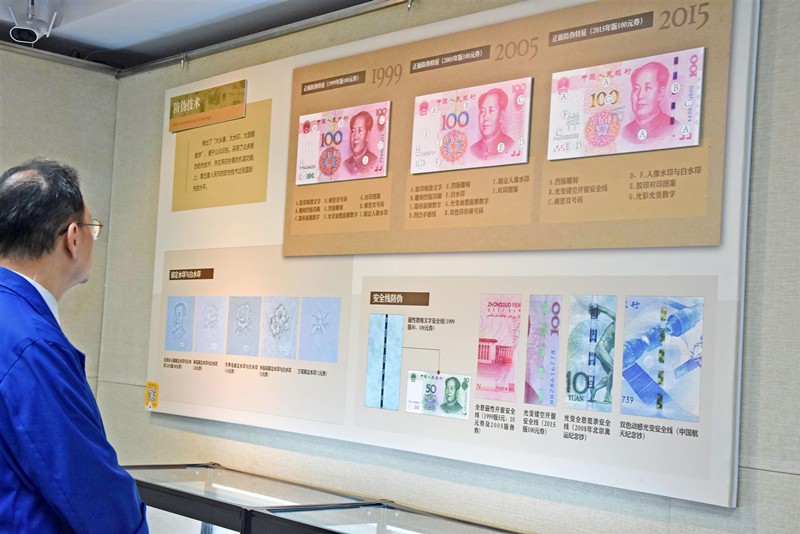


China Business Card - The 70th Anniversary Exhibition of RMB issuance in Shanghai (Photo by Zhou Dongchao from People’s Daily Online)
The Belt and Road Initiative (BRI) has fueled the yuan’s internationalization, particularly in the past two to three years as work on related projects accelerated. In Southeast Asia where economic relations with China are closer than in other countries and regions the yuan usage is getting popular, one expert told the Global Times on Monday, April 29.
However, he said that relatively strict foreign exchange policies in many BRI markets, as well as insufficient branch network of domestic financial institutions in those markets, are restricting the yuan’s internationalization in the short term.
“On the positive side, the growing pace of yuan use in BRI countries has been faster than the yuan’s overall usage in the world in recent years. The trend is particularly evident in some Southeast Asian countries like Singapore,” Zhou Yu, director of the Research Center of International Finance at the Shanghai Academy of Social Sciences, told the Global Times on April 29.
The Shanghai Sunrise Polymer Material Co is providing services and materials for several BRI construction projects in Laos, Malaysia, Cambodia and some African countries. The company’s director Fu Lefeng told the Global Times on April 29 that business settlements in those markets are shifting from a mostly US-dollar settlement pattern to a mixed currency settlement pattern where the yuan, local currencies and the US dollar are all used.
“For example, in Laos, we often settle balances in yuan while in Malaysia we often settle balances in the ringgit,” he said.
According to Fu, this change is taking place very “naturally” as local companies gradually accept yuan settlement in their increasingly active business interaction with Chinese companies. This trend is also facilitated by rapid business expansion of Chinese banks in BRI countries, he said.
According to a statement the Bank of China sent to the Global Times Friday, April 26, it has set up 12 offshore yuan-clearing banks, some of which are located in BRI countries like Malaysia. It is also helping local companies use the yuan for business settlement in countries along the routes of the BRI.
“As a Chinese company, we of course want to settle balances in yuan, which would help us avoid many exchange rate risks,” Fu said.
But Zhou cautioned that the strict foreign exchange policies in BRI countries, which are in general tighter compared with the developed countries, will hinder the yuan’s internationalization.
China’s State Administration of Foreign Exchange on April 22 published a report summarizing the foreign exchange policies of 123 countries and regions that have signed BRI cooperation documents with China. According to this report, those countries have different foreign exchange policies but most of them impose some level of restrictions, like cross-border capital flow controls, quota management programs and currency exchange limits.
Fu also said that BRI countries differ in terms of the tightness of their foreign exchange policies. “Some allow capital to flow relatively freely in and out. Some, like Laos, are tight on foreign exchange management. But in general, those policies wouldn’t impact Chinese companies’ local business too much, ” he said.
Zhou said that this problem can be eased by the signing of agreements between central banks in China and in BRI countries to “open an extra channel” for their investment projects.
He also said that Chinese banks’ branches in BRI countries remain inadequate, but it will take some time for this situation to improve.
“In the long term, I believe the yuan’s internationalization will be an evitable trend. It will also be a trend that not only benefits China but benefits BRI countries as many of those countries are also thirsty for foreign exchange,” he noted.
 Fire brigade in Shanghai holds group wedding
Fire brigade in Shanghai holds group wedding Tourists enjoy ice sculptures in Datan Town, north China
Tourists enjoy ice sculptures in Datan Town, north China Sunset scenery of Dayan Pagoda in Xi'an
Sunset scenery of Dayan Pagoda in Xi'an Tourists have fun at scenic spot in Nanlong Town, NW China
Tourists have fun at scenic spot in Nanlong Town, NW China Harbin attracts tourists by making best use of ice in winter
Harbin attracts tourists by making best use of ice in winter In pics: FIS Alpine Ski Women's World Cup Slalom
In pics: FIS Alpine Ski Women's World Cup Slalom Black-necked cranes rest at reservoir in Lhunzhub County, Lhasa
Black-necked cranes rest at reservoir in Lhunzhub County, Lhasa China's FAST telescope will be available to foreign scientists in April
China's FAST telescope will be available to foreign scientists in April "She power" plays indispensable role in poverty alleviation
"She power" plays indispensable role in poverty alleviation Top 10 world news events of People's Daily in 2020
Top 10 world news events of People's Daily in 2020 Top 10 China news events of People's Daily in 2020
Top 10 China news events of People's Daily in 2020 Top 10 media buzzwords of 2020
Top 10 media buzzwords of 2020 Year-ender:10 major tourism stories of 2020
Year-ender:10 major tourism stories of 2020 No interference in Venezuelan issues
No interference in Venezuelan issues
 Biz prepares for trade spat
Biz prepares for trade spat
 Broadcasting Continent
Broadcasting Continent Australia wins Chinese CEOs as US loses
Australia wins Chinese CEOs as US loses